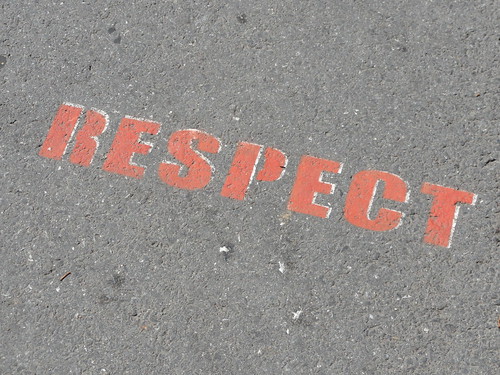A few weeks ago I asked my newsletter subscribers* to chime in on this question: “What is respect, to you?”
I asked the question because the topic of respect had been much on my mind based on some newsworthy events. In particular, I wanted to find out if very many people would agree with me that our society seems to be lacking in respect these days.
I was pleased to receive some very thoughtful responses. I don’t know if “pleased” is the right way to describe my feeling about the fact that nearly everyone who responded agreed that respect is in short supply in our current society.
Several friends (everyone who gets my newsletter is a friend, in my book) presented ideas for why respect has fallen out of fashion. We discussed it back and forth (I always try to reply when subscribers take the time to write back), and in general we thought the observed level of disrespect generally didn’t have to do with people being less respectable than they used to be. That is, everyone is still worthy of being respected. Instead, we discussed whether it might be a combination of two things: parents not teaching their children how to display respect, and adults in general not modeling respectful behavior for young people. Since respect seems to be something we learn (like manners, which themselves are indicators of respect), that led to the question of whether respect is something we need to practice lest we forget about it or start to ignore it.
One friend made an excellent distinction between “simple” respect and what he called “high” respect — the difference between the most basic respect we pay to someone as a fellow human being (or even that we pay to the uniform they wear or the office they hold), and the higher respect that they earn by … well, by acting respectable. I contend that we do people a terrible disservice if their failure to earn (or keep) our high respect leads us to deny them even simple respect. Furthermore, I think it’s possible to withhold a measure of respect without blatantly disrespecting someone — though it may be difficult, and uncomfortable.
Unfortunately, as another friend pointed out, some people have used respect as a shield — or perhaps a bludgeon — by demanding or expecting it rather than actually working to be respectable. She suggested that “the whole concept has been cheapened” as a result. I find that idea just as sad as the generally high level of disrespect I see every day.
I was interested in one friend’s equating respect with trust, and he’s right: it is very difficult to respect someone if we don’t trust them. That’s quite a contrast with respect as the foundation of manners, which can be thought of as the way we ensure that people are comfortable being around us: as one friend wrote, displaying good manners demonstrates that you respect someone. (One of the things I learned long ago about manners — in a talk given by Tony Campolo at a National Youthworkers Convention — is that they may be most needed when we least want to use them. When thought of that way, showing manners to people we may not respect very much demonstrates the difference between simple respect and high respect.)
As another friend wrote, “You don’t treat someone else with respect so that they treat you with respect, or even because you think they are ‘worthy’ of respect — you do it because YOU are worthy of respect, worthy of self-respect, able to meet your own eyes in the mirror.”

(Image: “Respect,” by Martin Abegglen, on Flickr under Creative Commons.)
I deeply appreciate everyone who offered their opinions and ideas. The more I think about it, the more I’m not sure we can overstate the hazard to society from being unwilling to treat people with simple, basic respect regardless of whether they have earned or squandered any deeper respect. That’s how debates boil over into arguments, arguments boil over into disputes, and disputes boil over into violence. The issue reminds me of an old Robert A. Heinlein quote about the loss of politeness (again, coming back to the question of manners, which themselves demonstrate respect), and how it’s “more significant than a riot” in identifying a dying culture.
I wish I knew how to fix it. I hope it can be fixed.
Do you have any insights? I’d love to hear them.
Thanks, as always, for your time!
___
*If you’re not on the list already, you can subscribe to my newsletter at this link.








